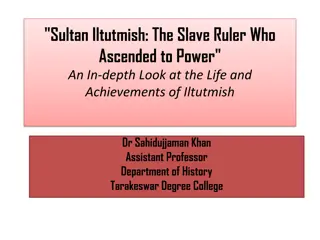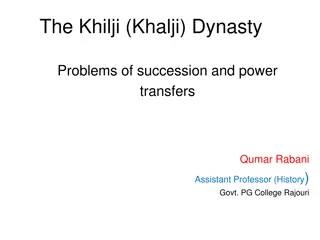Ghiyas-ud-din Balban: Rise to Power and Influence in Delhi Sultanate
Ghiyas-ud-din Balban, a former slave who rose to prominence in the Delhi Sultanate, played a crucial role in shaping its history. He served as a trusted advisor to multiple sultans, successfully repelled Mongol invasions, and eventually ascended to the throne himself. Despite facing initial challenges, Balban's loyalty, prowess, and political acumen solidified his power and popularity, making him a key figure in medieval Indian history.
Download Presentation

Please find below an Image/Link to download the presentation.
The content on the website is provided AS IS for your information and personal use only. It may not be sold, licensed, or shared on other websites without obtaining consent from the author. Download presentation by click this link. If you encounter any issues during the download, it is possible that the publisher has removed the file from their server.
E N D
Presentation Transcript
History, Degree Part-2,Paper-3,Unit-2, Topic- Balban, Dr.Md.ShakilAkhtar,lect.09,dated:22/7/2020
Ghiyas-ud-din Balban (1266 to 1287 A.D.) Balban like his master Iltutmish was born in a Turkish family of Ilbari Tribe. He was kidnapped by the Mongols in his early youth and was sold to a slave trader named Khwaja Jamal-ud- din. He took him to Delhi where he was purchased by Iltutmish. During his stay at Delhi, Iltutmish was very much impressed by the intelligence and ability of Balban and enrolled him as a member of the famous corps of the forty slaves.
During the reign of Raziya Sultana, he was promoted to the post of Amir- i-Shikar (Lord of the Hunt). He was loyal to Raziya in his early days. But later on he joined hands with the nobles who deposed Raziya Sultana from the throne of Delhi successfully. The next Sultan was Bahram Shah who gave him the Jagir of Rewari and Hansi in lieu of his service to him.
He played the role of a kingmaker. As a great warrior, he also successfully repelled a Mongol invasion during the period of Bahram Shah. Similarly he was instrumental in deposing Masud and raising Nasir-ud-din Mahmud to the throne of Delhi. Nasir- ud-din rewarded him by offering the post of principal adviser to the Sultan. He also strengthened his relations with Sultan by his daughter in-marriage to him.
The Sultan being pleased with the loyalty and devotion of Bulban, bestowed on him with the title of Ulugh khan and made him Naib-i- mamlikat or the Deputy Sultan. This was perhaps due to the fact that Nasir-ud-din was weak and incompetent and was relying more on him for the management of state affairs. As a result, the real power gradually passed into the hands of Balban.
His power and popularity grew more and more. He put down a number of internal rebellions and also checked the external aggressions especially of Mongols. The Sultan Nasir-ud-din felt him indispensable. As Nasir- ud-din had no heir to the throne, he had nominated Balban to be his successor. Nasir- ud-din Mahmud died in 1266 and Balban ascended the throne by assuming the title of Ghiyasuddin Balban.
His Early Difficulties: Balban had to face a number of problems after his accession to the throne. The affairs of the state had fallen into confusion as well as the prestige of the crown had sunk low due the misrule of weak and incompetent successors of Iltutmish. The powers of the nobles had increased and the majority of the members of the famous Forty had become disloyal to the throne.
They were proud, arrogant and were jealous of Balban. In the words of Barani, Fear of the governing power which is the basis of all good governments and the source of the glory and splendor of the state, had departed from the hearts of all men, and the country had fallen into a wretched condition.
The royal treasury was empty and the army was not well-organised. The Mongol invasion was imminent as well as the internal rebellions were raising their heads at regular intervals. Such was the critical stage, when Balban had been given the responsibility to face and fight. However he proved himself to be more than an equal for them
Restoration of the Crowns Prestige: Balban had realized that without the restoration of crown s prestige which had sunk low during the rule of weak successors of Iltutmish, no better and effective government could be possible. He also knew that this could be restored through the policy of absolute despotism. He believed that absolute despotism alone could exact obedience from his subjects and ensure security of the country.
He also knew that in order to be a successful despot one must follow the policy of theory of kingship. The concept of theory of kingship is that the right to rule is given by the God and not by the people and for his actions whether good or bad, the ruler is answerable and accountable to God but not to the people he rules.
Balban at first made out his concept of theory of kingship to his subjects. The main principle 1. Divine right of Kings: Balban said that the king was the representative of God on the earth and Kingship was a divine institution. He declared this to make the nobles believe that he got the crown or the Kingship not through their mercy but by the mercy of God.
2. Royal descent: Balban realized that people at that time believed that it was only the prerogative of the ancient royal families to rule and exercise power, he therefore declared that he was the descendant of the legendary Turkish warrior Afrasiyab and that circumstances only had made him a slave.
3. King as a despot: He said to his son Bughra Khan that Kingship is the embodiment of despotism . He believed that it is the King s superhuman awe and status which can ensure people s obedience. 4. Word of difference between descendants of noble lineage and commoners: Historian Zia-ud-Din Barni has gone to the extent of remarking that whenever Balban saw a man of low birth, his eyes started burning with rage and anger and his hands reached his sword to murder him.
This view seems to be on the extreme side. However this much is believable that because of this outlook of Balban, he dismissed all officials not born of noble families, from all important posts. 5. Recognition of tripartite relationship: Balban emphasized the relationship between God and the Sultan, Sultan and the people and the God and the people.
He considered himself the representative of God on the earth to look after the welfare of the people people created by God. Accordingly he emphasized that treasury should be used for the benefit of his subjects. Likewise the king should be impartial in dispensing justice. Measures to translate the theory of Kingship into operation:
1. Decorum and grandeur of the court: Balban enforced strict discipline in the court. No one was allowed to indulge in humour or loose talk. He maintained considerable distance from the courtiers. He prescribed the court dress. 2. Adoption of several ceremonies: Balban introduced the practice of Sijada in which the people were required to kneel and touch the ground with their forehead in salutation to the king.
3. Appointment of guards: Balban appointed fearsome and tall guards who were to stand round the king s person with naked swords in their hands. Whenever he used to go outside the palace, his bodyguards marched with him with naked swords and shouting Bismillah-Bismillah.
4. Following Persian traditions: Balban was convinced that the glory of Kingship was possible only by following the Persian traditions and he very carefully followed these traditions in his personal and public life. He named his grandsons on the pattern of Persian kings. He introduced several Persian etiquettes in his court.
5. Always reserved: Balban never expressed unusual joy or sorrow in public. It is said that even when the news of the death of his eldest son, Mohammad was conveyed to him, he remained unmoved and carried on the administrative work though in his private apartment, he wept bitterly. 6. Strong army: These is no doubt that a strong army is needed for the sustenance of a powerful monarch. Balban, therefore, strengthened his army.
7. Policy of blood and iron: A strong and absolute monarch is expected to follow a strict policy in dealing with his enemies. Balban accordingly adopted this policy. 8. Protection from foreign invaders: The strength of a despotic ruler is also measured by his ability to protect his subjects from external danger. Balban in this regard took effective steps.
Reference https://www.historydiscussion.net/biography/ biography-of-ghiyas-ud-din-balban/3040. https://www.historydiscussion.net/history-of- india/balbans-theory-of-kingship/2656. Chandra, Satish:Medieval India: From Sultanat to the Mughals. New Delhi: Har-Anand Publications. 1997.

























